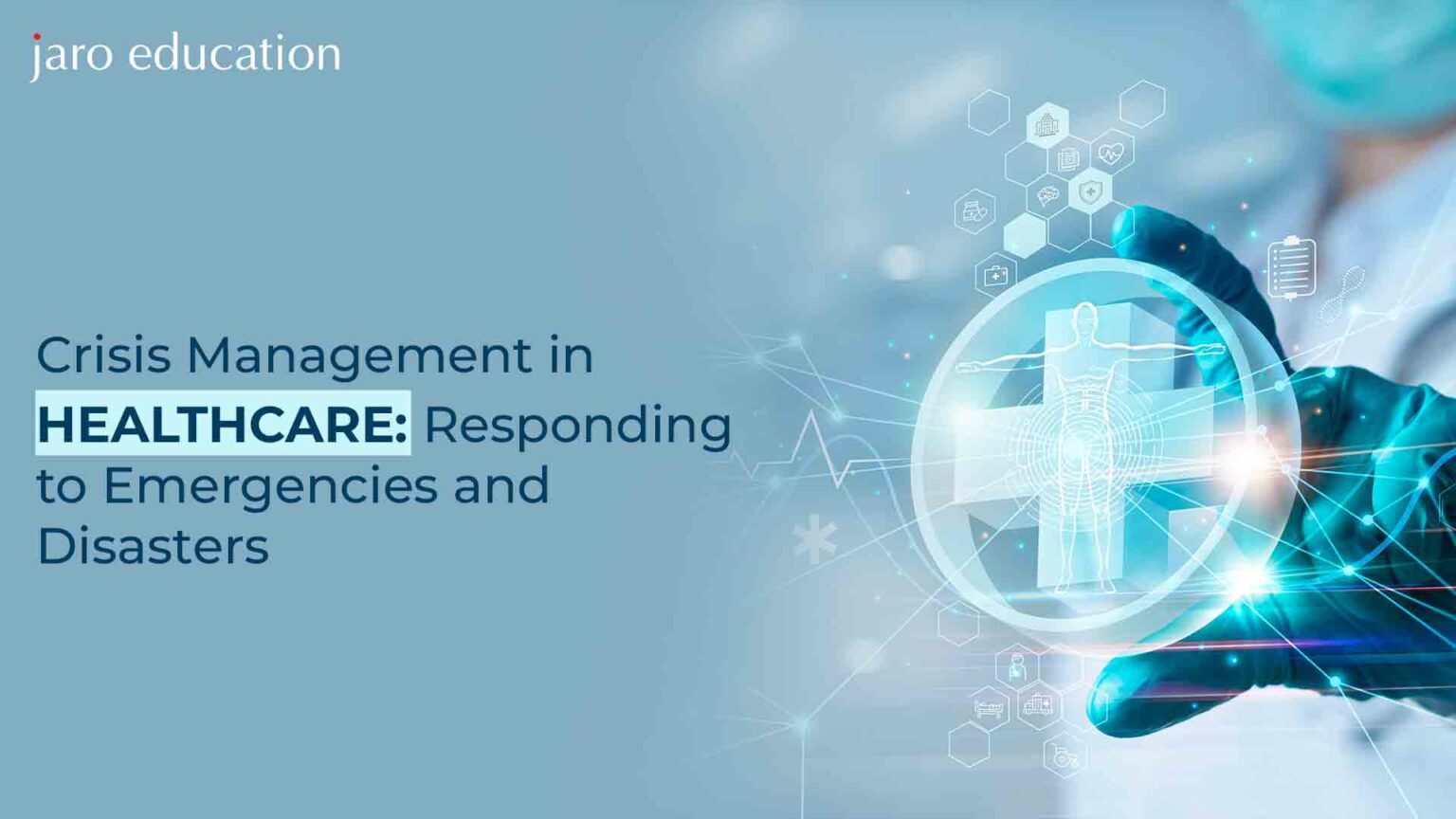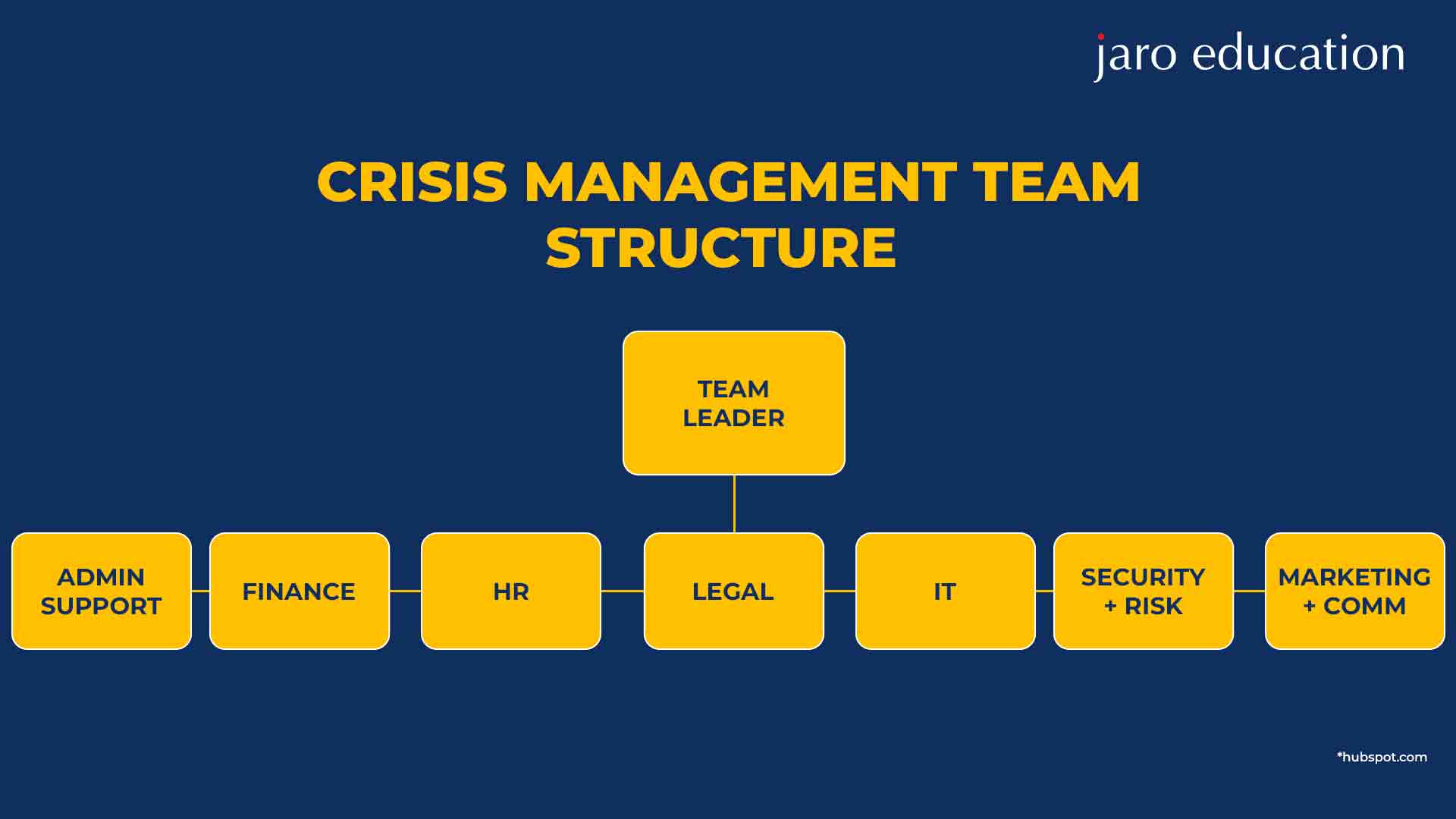Crisis Management in Healthcare: Responding to Emergencies and Disasters
Table of Contents

- jaro education
- 3, November 2023
- 11:00 am
The use of strategies meant to assist an organisation in dealing with a sudden change or a severe negative occurrence while ensuring business continuity is known as crisis management. It includes setting rules and processes in place to mitigate, protect, and avoid a crisis. In the healthcare sector, the job of crisis management can be difficult. The what-if policies and processes generally fail when dealing with severe negative impacts like COVID-19. When healthcare facilities fight against catastrophic conditions, it is important for everyone working in the organisations to draw effective crisis management plans.
Crisis management in healthcare falls under Health Services Management, which also deals with cyber attacks, data theft, and more. Professionals working at healthcare facilities must learn the basics of how to respond to emergency situations to keep their operations running smoothly.
How to Manage Healthcare Crisis Efficiently?
Effectively handling a healthcare crisis requires leadership that is attuned to the diverse needs of the population. This leadership should be well-planned, responsive, and empathetic. Strong leadership is essential even before a crisis occurs and must persist beyond the crisis period. Healthcare crisis management encompasses more than patient concerns; it also addresses the needs of caregiving staff. Healthcare executives should focus on preparation, communication, and swift action to ensure well-prepared personnel and maintain high-quality patient care. Here are key stages for delivering effective healthcare leadership during a crisis.
Creating a Disaster Plan
Leaders preparing for a healthcare crisis should contemplate the worst-case scenario and devise measures to address all aspects of it. Even though the organisation should agree on standard procedures for dealing with a crisis, it should also be able to adapt to any unforeseen circumstances relating to the event. Considerations that should be addressed in a plan will be:
- Objective of the plan
- Contact details for employees
- Technological equipment requirement
- Recovery procedures
- Plans for mobile setup
- Testing the plan
- Steps for rebuilding
- Changes to the plans (if and when needed)
Forming a Crisis Leadership Team
Creating a team to enable a crisis response, preferably before the problem arises, should be a top priority for leadership. Typically, the team should comprise members from the following business areas:
- Human resources
- Department leadership
- Board of Directors
- Marketing and Communication
- Executive management
This group should be prepared to communicate with various departments, analyse problems, and provide solutions while leading the crisis response.
Sharing Information with Everyone
In crisis leadership, transparency is essential, and crisis response information should be disseminated as widely as feasible. It is preferable to share the facts face to face at first, even if by video. However, the message should not end with one announcement. Repetition of information over many communication channels helps guarantee that patients, the general public, and employees have received and comprehended it.
Looking Out for Credible Information
Getting responses from reputable sources is part of strong crisis leadership. The Centre for Creative Leadership emphasises the importance of acquiring and sharing credible information for various reasons, such as:
- To ease apprehension about uncertainties.
- To provide explicit guidance on the next steps.
- To show both employees and the public that leadership is attentive and engaged.
Extending Care for Employees and Patients
A healthcare crisis necessitates remarkable patient care. At the same time, the enormous demands placed on medical services by a crisis might leave healthcare organisations with insufficient resources to offer emergency treatment. Thus, effective healthcare crisis management involves balancing patient reassurance while preparing medical workers to deal with the stress they confront. Healthcare providers however, may not have faced such an extreme situation. So, it is critical for leaders to create a clear action plan that they will communicate with the medical personnel.
To help meet employee needs so they can extend care to patients, leaders must:
- Communicate about the overall expectation of the extreme situation, COVID-19, for instance.
- Leaders should seek expertise and resources from outside organisations through collaborations. For example, during the COVID-19 epidemic, several engineering and industrial organisations stepped up to create novel treatment procedures and protective equipment.
- Leaders that put employee needs, including physical endurance and job satisfaction, first can help employees avoid burnout and guarantee top-notch patient care.
What Are the Responsibilities of a Crisis Management Team?
The responsibilities of the crisis management team extend beyond the immediate disaster, just as healthcare executives are required to manage a crisis at all stages: before, during, and after the event. The following are some particular responsibilities they must perform.
Planning to Fight the Emergency or Disaster
Planning different crisis situations is one of the prime responsibilities of the crisis management teams in healthcare facilities. Teams should include activities like:
- Assessing stakeholders’ worries about a possible catastrophe.
- Creating plans to assist in maintaining the financial stability of the healthcare facility.
- Making and abiding by a crisis response strategy, including how to manage internal and external crisis communication.
- Identifying and assuring the availability of resources to respond to the crisis.
- Training employees in crisis response techniques.
- Analysing the possible vulnerabilities of the organisation in the event of a crisis.
- Creating health and safety guidelines for staff to follow throughout the crisis.
Helping Leaders During an Emergency
In the event of a healthcare emergency, it is essential for the team to work in tandem with the organisation’s management to execute the established strategy for addressing the situation. The following are the crucial actions undertaken by the team during such emergencies:
- Determining the occurrence of the disaster.
- Knowing how the crisis or disaster is going to impact employees, patients and the general public.
- Identifying the right time for establishing the crisis plan.
- Interacting with patients, employees and other stakeholders about the crisis.
- Collaborating with staff assistance.
Assessing the Response to Crisis
After a healthcare crisis, it is imperative for the team to evaluate the effectiveness of its plan. This evaluation should consider what worked well and identify areas that require improvement. This assessment process involves the following steps:
- Modifying the crisis management strategy as needed.
- Changes in catastrophe planning must be communicated.
- Replacing equipment and other resources utilised in crisis response.
- Creation of drills to test improved plans.

*hubspot.com
What Are the Common Mistakes to Avoid During Crisis Management in Healthcare?
Crisis management in healthcare may be difficult and complicated, requiring strong leadership, decision-making abilities and communication. Here are some common mistakes that organisations can avoid during healthcare crisis management.
Ethical dilemmas
A prevalent difficulty in healthcare crisis management is ethical dilemmas, which occur when opposing interests, ideals and beliefs are involved in the crisis response. The ethical predicament may involve issues of beneficence, fairness, autonomy and justice who receive precedence in accessing finite resources, balancing individual rights and public health, and dealing with ambiguity and uncertainty.
Unpreparedness
Being unprepared for a possible disaster is one of the most common blunders in healthcare crisis management. This might result in delayed or insufficient answers, confusion, and disorder. Inadequate risk assessment, contingency planning, training, and resource allocation can all lead to a lack of preparation. For instance, when the 2014 Ebola outbreak happened in West Africa, many governments were unable to deal with the epidemic’s extraordinary magnitude, intensity and encountered difficulties detecting, isolating, and treating patients, as well as preventing transmission and handling societal unrest.
Leadership Failures
Leadership failures, which may occur at many levels and stages of the crisis response, are another typical error in healthcare crisis management. Lack of direction, coordination, vision, or accountability among leaders, as well as poor delegation, decision-making or supervision, are examples of leadership failures. For example, following Hurricane Maria’s occurrence in Puerto Rico in 2017, federal and municipal officials were chastised for failing to give enough and timely help to the affected populace and for a lack of openness, responsiveness, and empathy.
Poor Communication
Poor communication, both internally and publicly, is another common mistake in healthcare crisis management. Poor communication can lead to disinformation, mistrust, and fear among crisis response stakeholders. It may also impede coordination and collaboration among the many individuals and agencies involved. For example, during the 2003 SARS outbreak in China, officials initially withheld information about the outbreak, delaying the worldwide response and contributing to the disease’s spread. Furthermore, the authorities’ failure to communicate clearly and consistently produced uncertainty and panic among the general population and healthcare staff.
Conclusion
Knowing how to deal with a crisis in healthcare is an important aspect these days. Strong leadership, an effective crisis plan, a responsible crisis management team, and good communication are important factors in establishing healthcare crisis management. Often, healthcare organisations make common mistakes while creating a proper crisis plan. So, it is necessary to think about handling a crisis situation even before it happens so that people are prepared enough to fight whatever is coming their way.
Professionals who want to pursue their careers in the healthcare sector must understand the importance of health service management and crisis management. But, without proper knowledge and skills, it becomes difficult for them to formulate effective crisis plans. IIM Ahmedabad features an Executive Programme in Health Services Management to address these vital needs. In this 6-7 months programme, you will acquire all the necessary practices and skills that you can exercise in the healthcare industry to better patient-centric care.This programme allows managers and healthcare providers to adapt to the transforming landscape of healthcare and to offer patient-centric care. Register with Jaro Education to know more about this programme.









